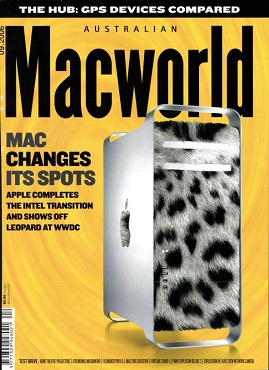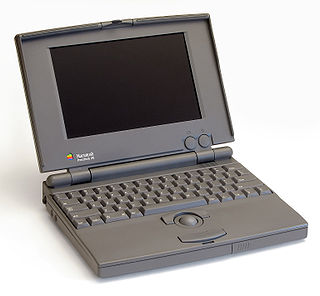A gossip columnist is someone who writes a gossip column in a newspaper or magazine, especially in a gossip magazine. Gossip columns are written in a light, informal style, and relate opinions about the personal lives or conduct of celebrities from show business, politicians, professional sports stars, and other wealthy people or public figures. Some gossip columnists broadcast segments on radio and television.

The Macintosh Classic is a personal computer designed, manufactured and sold by Apple Computer from October 1990 to September 1992. It was the first Macintosh to sell for less than US$1,000.

John C. Dvorak is an American columnist and broadcaster in the areas of technology and computing. His writing extends back to the 1980s, when he was a regular columnist in a variety of magazines. He was vice president of Mevio, and has been a host on TechTV and TWiT.tv. He is currently a co-host of the No Agenda podcast.
Macworld/iWorld was an information technology trade show with conference tracks dedicated to Apple's Mac platform. It was held annually in the United States during January. Originally Macworld Expo and then Macworld Conference & Exposition, the gathering dates back to 1985. The conference was organized by International Data Group (IDG), co-publisher of Macworld magazine.

MacWEEK was a controlled-circulation weekly trade journal that focused on the Apple Macintosh. MacWEEK was based in San Francisco and founded by Michael Tchong, John Anderson, Glenn Patch, Dick Govatski, and Michael F. Billings. It featured a back-page rumor column penned by the pseudonymous Mac the Knife.
Power Computing Corporation was the first company selected by Apple Inc to create Macintosh-compatible computers. Stephen “Steve” Kahng, a computer engineer best known for his design of the Leading Edge Model D, founded the company in November 1993. Power Computing started out with financial backing from Olivetti and Kahng.
The Worldwide Developers Conference (WWDC) is an information technology conference held annually by Apple Inc. The conference is usually held at Apple Park in California. The event is usually used to showcase new software and technologies in the macOS, iOS, iPadOS, watchOS, and tvOS families as well as other Apple software; new hardware products are sometimes announced as well. WWDC is also an event hosted for third-party software developers that work on apps for iPhones, iPads, Macs, and other Apple devices. Attendees can participate in hands-on labs with Apple engineers and attend in-depth sessions covering a wide variety of topics.

Michael Musto is an American journalist who has long been a prevalent presence in entertainment-related publications, as well as on websites and television shows. Best known as a columnist for The Village Voice, where he wrote the La Dolce Musto column of gossip, nightlife, reviews, interviews, and political observations, in 2021, he started writing articles about nightlife, movies, theater, NYC, and LGBTQ politics for the revived Village Voice, which returned as a print publication, with accompanying website.

Stevenote is a colloquial term for keynote speeches given by Steve Jobs, former CEO of Apple, at events such as the Apple Worldwide Developers Conference, Macworld Expo, and Apple Expo. Because most Apple product releases were first shown to the public at these keynotes, "Stevenotes" caused substantial swings in Apple's stock price.

The iMac G3, originally released as the iMac, is a series of Macintosh personal computers Apple Computer sold from 1998 to 2003. The iMac was Apple's first major product release under its CEO Steve Jobs, who had recently returned to the financially troubled company he co-founded after eleven years away. Jobs reorganized the company and simplified the product line. The iMac was designed as Apple's new consumer desktop product—an inexpensive, consumer-oriented computer that would easily connect to the Internet.

Rhapsody is an operating system that was developed by Apple Computer after its purchase of NeXT in the late 1990s. It is the fifth major release of the Mach-based operating system that was developed at NeXT in the late 1980s, previously called OPENSTEP and NEXTSTEP. Rhapsody was targeted to developers for a transition period between the Classic Mac OS and Mac OS X. Rhapsody represented a new and exploratory strategy for Apple, more than an operating system, and runs on x86-based PCs and on Power Macintosh.
The Apple community is a group of people interested in Apple Inc. and its products, who report information in various media. Generally this has evolved into a proliferation of websites, but latterly has also expanded into podcasts, either speculating on rumors about future product releases, simply report Apple-related news stories, or have discussions about Apple's products and how to use them.
SoundJam MP is a discontinued MP3 player for classic Mac OS-compatible computers and Rio-compatible hardware synchronization manager that was released in July 1999 and was available until June 2001. Jeff Robbin and Bill Kincaid developed SoundJam MP with assistance from Dave Heller. Robbin and Kincaid chose Casady & Greene to publish SoundJam MP. Apple, Inc. purchased SoundJam MP in 2000 and further developed the code to create iTunes version 1.0. Casady and Greene ceased publication of SoundJam MP in June 2001 at the request of the developers.

Chris Espinosa is a senior employee of Apple Inc., officially employee number 8. Having joined the company at the age of fourteen in 1976 when it was still housed in Steve Jobs's parents' garage, writing software manuals and coding after school, he is the company's current and all-time longest-serving employee.

Macworld Australia was the Australian version of the Macworld brand and magazine, carrying a combination of licensed content from the US and UK publications. It was the longest running Apple magazine outside the USA: running from 1985 to 2018.

The PowerBook 100 is a portable subnotebook personal computer designed and manufactured by Sony for Apple Computer and introduced on October 21, 1991, at the COMDEX computer expo in Las Vegas, Nevada. Priced at US$2,500 with external floppy drive, the PowerBook 100 was the low-end model of the first three simultaneously released PowerBooks. Its CPU and overall speed closely resembled those of its predecessor, the Macintosh Portable. It had a Motorola 68000 processor at 16 MHz, 2-8 megabytes (MB) of RAM, a 9-inch (23 cm) monochrome backlit liquid-crystal display (LCD) with 640 × 400 pixel resolution, and the System 7.0.1 operating system. It did not have a built-in floppy disk drive and was noted for its unique compact design that placed a trackball pointing device in front of the keyboard for ease of use.
Bob LeVitus is an American author of more than 75 computer-related books, particularly on the Apple Macintosh, iPhone, and iPad for the book series ...For Dummies. He worked as a columnist for the Houston Chronicle since 1996 and for The Mac Observer since 2001, until his retirement from both outlets in 2022. In 2001, Macworld magazine described him as "a well-known columnist and speaker in the Mac world".

The Berkeley Macintosh Users Group, or more commonly "BMUG", was the largest Macintosh User Group. It was founded in September 1984 by a group of UC Berkeley students including Reese Jones and Raines Cohen as a focal-point for the nascent Apple Macintosh user community. With more than 13,000 members, or "BMUGgers" at its peak in 1993, the group was the largest, and generally understood to be the most important, Macintosh users group. A few of the notable members include John "Captain Crunch" Draper, the Sultan of Brunei Hassanal Bolkiah, notorious murderer Enrique Zambrano, early hacker-chaser Cliff Stoll, Inktomi founder Eric Brewer, and may prominent computing journalists like John Dvorak, Ilene Hoffman, Leo Laporte and Adam Engst. An example of the group's omnipresent blue-floppy-disk lapel pin is held in the Smithsonian Institution's American History collection. BMUG's history and activities were closely linked with the MacWorld Expo meetings, traditionally held in San Francisco each January and Boston each August.
Aileen Mehle, known by the pen name Suzy or Suzy Knickerbocker, was an American society columnist, active in journalism for over fifty years. Her column was syndicated to 100 newspapers and read by over 30 million people.

iPhone OS 1 is the first major release of iOS, Apple's mobile operating system. It was succeeded by iPhone OS 2 on July 11, 2008.











